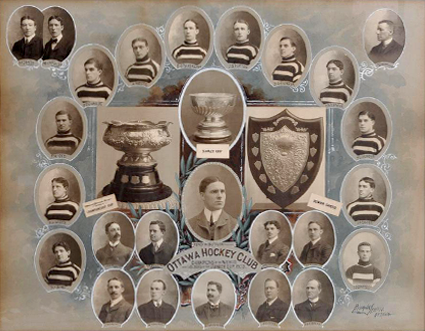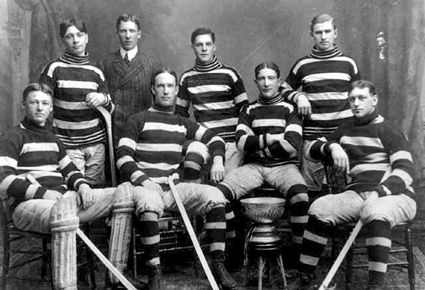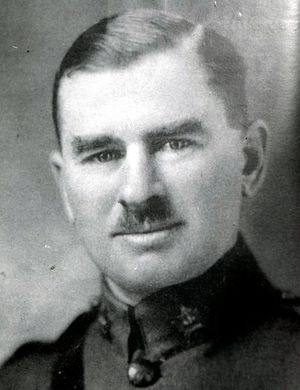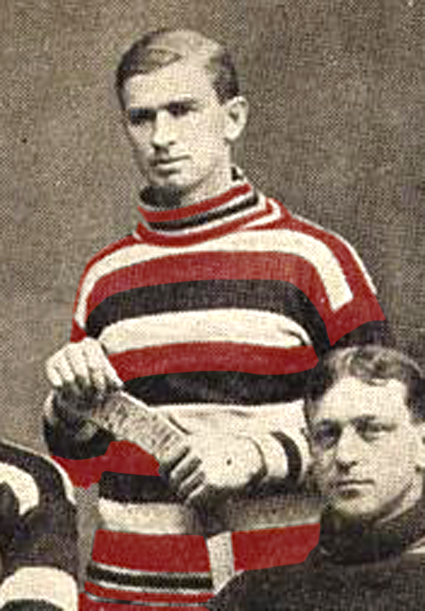Saturday, January 16, 2016
1905 Ottawa Silver Seven Frank McGee Jersey
Born in 1882, Frank McGee excelled at sports, rowing, playing lacrosse and rugby, which included winning a Canadian championship in 1898. But what McGee is best remembered for was his goal scoring prowess at hockey.
In 1900, at the age of 17, while playing in a charity exhibition game with a local Canadian Pacific Railway team, McGee permanently lost the sight in one eye when hit with a high stick. He quit playing to become a referee, but quickly returned to playing despite the risk of losing the vision in his remaining good eye.
After playing junior and intermediate level hockey in his native Ottawa, he joined the Ottawa Hockey Club for the 1903 season. He appeared in six of the club's eight games and immediately showed his offensive skills with 14 goals to place second overall in the Canadian Amateur Hockey League.
In the CAHL playoffs, McGee and Ottawa faced off against the Montreal Victorias in a two-game total-goal series for the rights to the Stanley Cup. Game 1 finished tied at 1-1, with McGee held scoreless. Ottawa roared to life in Game 2, however, as McGee led the Ottawa onslaught with a hat trick as they overpowered the Victorias 8-0. As a result of their 9-1 triumph, Ottawa became league champions were declared holders of the cup for the first time in club history.
Two days later the new champions were challenged for their new trophy by the Rat Portage Thistles in a best-of-three series. Game 1 went to Ottawa 6-2, with McGee scoring twice. Two days later, Ottawa successfully defended their trophy with a 4-2 win, with McGee scoring twice more, including the cup winning goal at 8:20 of the first half, as the game had yet to be divided into three periods. As a reward for their victory, each member of the squad would receive a silver nugget, which gave birth to the team's new nickname, The Silver Seven.
The Stanley Cup champion 1903 Ottawa Hockey Club
Before the 1904 CAHL season began, Ottawa faced another challenge for the Stanley Cup, this from the Winnipeg Rowing Club. A best-of-three series, play began on December 30th, 1903. When the series concluded on January 4, 1904, the Silver Seven prevailed after a 9-1 win, a 6-2 loss and a 2-0 shutout in Game 3.
Ottawa had a tumultuous 1904 season, as they withdrew from the CAHL after only four games and joined the new Federal Amateur Hockey League, but did not participate in any of the FAHL regular season games. In the four CAHL games Ottawa did compete in, McGee scored 12 times, which was still good enough to place him fifth in the final scoring totals.
After leaving the CAHL, the Silver Seven would face a cup challenge from the Toronto Marlboros, whom they would turn away 2 games to none in their best-of-three challenge in late February of 1904.
Once the FAHL regular season was concluded, it's regular season champions, the Montreal Wanderers met the Silver Seven to compete in a two-game, total-goal series for the FAHL championship and the rights to the Stanley Cup that went with it. At least that was the plan. The first game ended in a 5-5 tie when the Wanderers refused to play overtime with the same referee in charge and then had the temerity to demand the series begin anew as a best-of-three! When the trustees of the cup ordered the series to continue as planned, the Wanderers abandoned their challenge, leaving the Silver Seven as FAHL champions despite their having played but a single tie game in league competition! During the tie game, McGee added another goal to his career total.
A final challenge to Ottawa was arranged for one week later, this from Brandon Wheat Cities in another best-of-three format, which the Silver Seven turned away with a pair of victories. While McGee had only played in four regular season games during the 1904 season, he skated in eight cup challenge games, scoring 21 times as the Silver Seven turned away no less than four separate challengers.
In their first full season of FAHL competition in 1905, Ottawa came first with a 7-1 record as McGee would tie for the league lead with 17 goals, but he would score his while playing in two less games than Jack Marshall. The highlight of McGee's regular season would be a five goal performance on February 4th.
During the season, the Dawson City Nuggets would travel 4,000 miles from the Yukon to challenge Ottawa. Their trip would take a month to complete and include traveling on foot, by sled dog, automobile, ship and train. Game 1 of the best-of-three would go to Ottawa by a score of 9-2, with McGee scoring once. Game 2 on this date in 1905 would be one for the ages, as Ottawa continued to pile up goals at a furious pace, eventually winning by an unfathomable 23-2 final score with McGee setting a record which still stands today, as he scored an incredible 14 times! Eight of McGee's goals were consecutive and came in under nine minutes of playing time.
As league champions, Ottawa retained the cup and was challenged once again by the Rat Portage Thistles. McGee did not play in Game 1, which was won by the Thistles 9-3. McGee returned for Games 2 and 3, which were won by Ottawa 4-2 and 5-4 with McGee scoring three times.
The Stanley Cup champion 1905 Ottawa Silver Seven
For the 1906 season, the Silver Seven moved to the new Eastern Canada Amateur Hockey Association. They tied for the best record at 9-1. McGee was third in league scoring with 28 goals in seven games, which included an eight goal performance on March 3rd.
Ottawa would face two challenges during the regular season, first from Queen's University in a best-of-three. After Game 1 went the way of the Silver Seven 16-7, there was little doubt that the cup would change hands, which was confirmed by a 12-7 score in Game 2. McGee scored four times in Game 1.
Just prior to the end of the regular season, Ottawa again had to face a cup challenge, this from Smiths Falls in another best-of-three series. Ottawa had little trouble defending it's now three year grip on the Stanley Cup, as they won two straight by scores of 6-5 and 8-2. In all, McGee scored 15 times in the four cup challenge games that season.
The final two games of McGee's career came in the ECAHA playoffs on March 14th and 17th, 1906. The series was a two-game, total-goal affair. The Montreal Wanderers put in an early claim on the cup with a resounding 9-1 win in the first game.
Ottawa was down, but not out, as they entered Game 2, but 12 minutes in, Montreal scored again to increase their lead to nine goals. McGee got Ottawa on the board in the first half and again before the half ended to help cut the margin to 10-4. The Silver Seven would come out flying in the second half, and score six consecutive goals to even the series at 10-10! In the final seven minutes of the contest, Lester Patrick would score to put Montreal in front and then end the three year reign of the Silver Seven with an empty net goal in the final seconds.
It would be McGee's final game as a hockey player in a career which spanned four seasons, divided between 23 regular season games in which he scored 71 goals, an average of more than three per game. Mc Gee would also participate in 22 playoff and Stanley Cup challenge games during which he would score 63 times, including his record 14 in one game in 1905, all while only having vision in one eye.
Frank Patrick was quoted as saying about McGee, "He was even better than they say he was. He had everything - speed, stick handling, scoring ability and was a punishing checker. He was strongly built but beautifully proportioned and he had an almost animal rhythm."
Following his retirement as a player at just 23 years of age, said to be because his government job would not allow him to travel. Despite having vision in only one eye, he somehow was accepted into the military at age 32. His certificate of examination noted that McGee could "see the required distance with either eye" after he apparently tricked the doctor by covering his bad eye with first one hand and then the other during his exam.
He began to serve in May of 1915 before suffering a knee injury when his vehicle was hit by an artillery shell. While out of action he was given the opportunity to take a non-combat posting in the northwest of France far from the battle, but chose instead to return to the front in August only to be killed in action on September 16, 1916. His body was never recovered.
Lieutenant Frank McGee
McGee was later elected to the Hockey Hall of Fame in the first class to be inducted in 1945.
Today's featured jersey is a 1905 Ottawa Silver Seven Frank McGee jersey as worn during his record setting 14 goal game against Dawson City. The Senators trademark red, black and white horizontal "barberpole" stripes were first adopted in 1903, and except for one season with vertical stripes in 1910-11, remained in use through the original Senators final season in Ottawa of 1933-34, with the addition of the letter "O" crest from 1929-30 on.
Labels:
McGee Frank,
Ottawa Senators,
Ottawa Silver Seven
Subscribe to:
Post Comments (Atom)















No comments:
Post a Comment
We welcome and encourage genuine comments and corrections from our readers. Please no spam. It will not be approved and never seen.